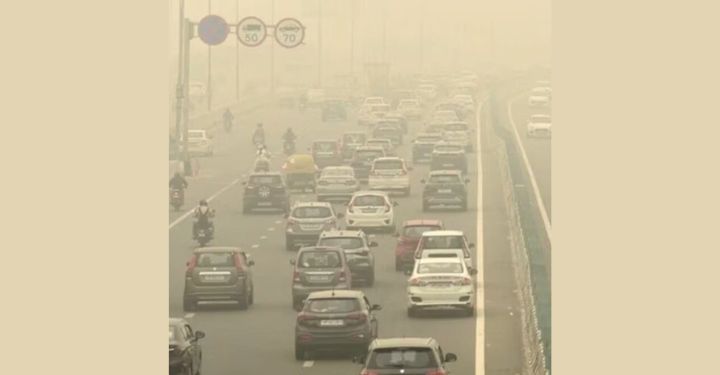In response to the deteriorating air quality in the national capital and surrounding regions, authorities have initiated Stage I of the Graded Response Action Plan (GRAP) across Delhi-NCR. This decision, announced on October 14, 2025, comes after the Air Quality Index (AQI) breached the 200 mark, placing it in the “Poor” category, with the current reading hovering around 211.
The Commission for Air Quality Management (CAQM) has triggered GRAP’s first phase to act as a preventive measure before conditions worsen. With winter approaching, Delhi’s pollution is expected to rise further due to reduced wind speeds, stubble burning in neighbouring states, and increased local emissions.
What is GRAP Stage I?
The Graded Response Action Plan is a regulatory mechanism designed to respond to worsening air quality in a phased manner. It consists of four stages, each with increasing severity and corresponding restrictions. Stage I is activated when the AQI enters the 201–300 range (Poor). The objective is to implement early measures that prevent further deterioration, rather than waiting for the crisis to deepen.
Key Restrictions Under Stage I
With GRAP Stage I now in force, the following restrictions and advisories have been issued:
- Construction and Demolition (C&D) Rules:
All construction projects must implement dust mitigation measures such as water sprinkling, wind-breaks, and covering of materials. For any project over 500 square meters, a dust mitigation plan must be approved and followed strictly. Violators will face penalties. - Open Waste Burning Ban:
Municipal authorities have been instructed to enforce a complete ban on open burning of garbage, leaves, crop residues, or biomass. This includes areas under both municipal corporations and rural panchayats. - Generator Use Restrictions:
The use of diesel generator (DG) sets is restricted to emergency and essential services only. This applies to residential societies, construction sites, and commercial establishments. - Fuel Regulations for Street Vendors:
Roadside eateries and vendors are not allowed to use coal or wood for cooking. They must switch to cleaner fuels like LPG or electricity. - Traffic Management:
Police and traffic officials are directed to ensure smoother vehicle flow. Drivers are advised to switch off engines at red lights. Vehicles that are visibly polluting or non-compliant with norms may be fined or seized. - Older Vehicles Targeted:
Strict enforcement continues on the ban of diesel vehicles over 10 years and petrol vehicles over 15 years in Delhi. Non-compliant vehicles will be impounded. - Inter-state Coordination:
The CAQM has also directed governments in Haryana, Uttar Pradesh, and Rajasthan to enforce GRAP measures in their NCR districts, ensuring a uniform approach across the region.
Why the Air is Getting Worse
Experts point to a combination of meteorological and human factors behind the rising pollution:
- Stubble Burning:
The onset of the paddy harvesting season in Punjab and Haryana leads to large-scale burning of crop residue. With wind blowing toward Delhi, the city becomes a receptor of agricultural smoke. - Low Wind Speed & Temperature Inversion:
During this season, wind speeds drop, and colder air traps pollutants near the surface—a phenomenon known as inversion—leading to smog build-up. - Construction Activity:
Ongoing infrastructure projects—roads, flyovers, housing complexes—contribute to uncontrolled dust emissions, particularly in outer Delhi and NCR towns like Gurugram, Noida, Ghaziabad, and Faridabad. - Vehicle Emissions:
Delhi’s roads witness over 11 million registered vehicles, and vehicular pollution remains a major year-round contributor to poor air quality.
Public Advisory
Authorities have issued the following guidelines for citizens to minimize exposure and contribute to the clean air campaign:
- Avoid strenuous outdoor activity, especially during early morning and evening hours when pollution peaks.
- Wear N95 or certified pollution masks when commuting.
- Use public transport, carpooling, or metro systems instead of private vehicles.
- Report violations, such as open burning or construction dust, via official civic apps or helplines.
- Keep indoor air clean by using air purifiers and avoiding incense sticks or indoor smoking.
- Refrain from using fireworks during festivals, as these worsen PM2.5 levels significantly.
Challenges in Implementation
Although GRAP provides a structured response, its real-world effectiveness depends on robust enforcement, civic participation, and political coordination.
- Monitoring & Enforcement Gaps:
Civic agencies often lack manpower to monitor compliance across thousands of construction sites and roadside vendors. - Informal Sector Non-Compliance:
Many small businesses, especially unregistered vendors, continue to use polluting fuels due to cost and accessibility issues. - Transboundary Pollution:
Delhi’s air is heavily impacted by emissions from outside the city. Unless surrounding states also act stringently, Delhi alone cannot clean its air. - Public Apathy:
Despite repeated advisories, many residents continue to use private vehicles unnecessarily or ignore rules like turning off engines at red lights.
Looking Ahead
The CAQM has made it clear that if conditions worsen, it will have no choice but to activate Stage II or III of GRAP, which includes bans on more activities like non-essential construction, stone crushers, and diesel vehicle movement.
As Delhi prepares for Diwali and the upcoming winter season, the situation remains precarious. Air pollution is now a recurring public health emergency, not a seasonal anomaly. Authorities and citizens must work together to act early, act fast, and act collectively.
Failure to do so could lead to a repeat of previous years, where the city became one of the most polluted urban areas in the world, with schools shut, flights diverted, and hospitals overwhelmed by respiratory cases.

